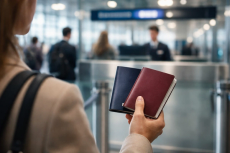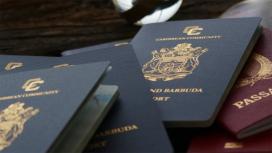Blog • Published on:November 3, 2025 | Updated on:November 3, 2025 • 15 Min
Africa’s New Wave of Citizenship by Investment in 2025
Africa is stepping into the global citizenship arena.
While the Caribbean and Europe have long dominated the investment migration space, 2025 marks the rise of a new generation of African Citizenship by Investment (CBI) programs.
From São Tomé and Príncipe to Botswana, and Sierra Leone, the continent is building its own blueprint for economic growth, mobility, and global engagement.
These represent a broader vision, turning investment into impact, and citizenship into connection.
Understanding Africa’s New CBI Landscape in 2025
What Defines Africa’s Citizenship by Investment Landscape in 2025?
The investment migration map is changing, and Africa is now part of the conversation.
In 2025, several African nations have either launched or formalized citizenship by investment frameworks, moving beyond traditional tourism or commodity exports to attract sustainable foreign capital.
These new programs are designed not only to raise government revenue but also to fund infrastructure, tourism, and energy projects.
Unlike the Caribbean, where CBI has become a mature, standardized model, Africa’s approach is still flexible, adaptive, and impact driven.
What Are the Current Market Trends and Opportunities?
The rise of African CBI signals a strategic shift:
- Investors are seeking early entry into emerging markets with low investment thresholds.
- Governments are leveraging CBI to finance national development plans.
- Africa’s growing connectivity through the African Continental Free Trade Area adds long-term economic value to citizenship in the region.
These programs are also positioned as alternatives to Caribbean or European options, especially for investors based in the Middle East, Asia, and Africa who prefer shorter approval timelines and regional familiarity.
For a full global perspective, see our Residency and Citizenship 2025 Guide.
How Does Africa Compare to Established CBI Regions?
While Caribbean programs like Saint Kitts and Nevis or Grenada are known for their strong visa-free access and reliability, Africa’s new offerings compete on affordability, growth potential, and business integration.
Investments in Africa often come with tangible outcomes, from funding sustainable tourism in São Tomé and Príncipe to backing small business ecosystems in Botswana.
Key African CBI Programs
São Tomé and Príncipe’s Investment Migration Initiative
Among Africa’s new programs, São Tomé and Príncipe stands out for its accessibility and efficiency.
With a minimum contribution of $90,000 and processing time of just 1–2 months, the program offers citizenship through direct investment into national development projects.
Holders of the São Toméan passport enjoy visa-free, visa-on-arrival, and eVisa access to over 95 destinations, including Hong Kong, Singapore, and South Africa.
Read more in our guide: São Tomé and Príncipe Visa-Free Countries.
Beyond mobility, investors are participating in a nation-building initiative focused on renewable energy, tourism, and infrastructure.
Best For: Investors looking for a fast, affordable, and transparent route to African citizenship with tangible national impact.
Botswana’s New Citizenship by Investment Program
Botswana is a serious contender in the African investment migration space.
Renowned for its political stability, low corruption levels, and strong financial governance, Botswana has introduced a CBI program set to launch by 2026.
The minimum investment is expected to start at around $75,000, making it the most affordable path to citizenship globally.
But it’s not only about cost. Botswana is one of Africa’s most stable democracies, home to the world’s largest diamond reserves and a strong rule of law.
Through this initiative, the government aims to reduce reliance on mining, attract entrepreneurs, and diversify the economy through sustainable investment.
Best For: Entrepreneurs seeking an affordable entry point into Africa’s most stable and business-friendly environment.
Sierra Leone’s Citizenship by Investment Path
Sierra Leone offers a rare blend of heritage-based and investment-based citizenship opportunities.
Originally launched to reconnect the African diaspora, the program now allows investors to obtain citizenship through national development contributions supporting tourism and infrastructure.
The program offers citizenship for a $140,000 government contribution, or $100,000 for applicants who can prove African ancestry, creating a genuine bridge between economic participation and cultural belonging.
As a member of ECOWAS, Sierra Leone provides citizens with easier travel across 12 West African nations, including Ghana, Senegal, and Nigeria.
Best For: Investors of African descent or global citizens seeking a meaningful connection to heritage alongside long-term regional access.
Egypt’s Citizenship by Investment Program
Egypt’s CBI program remains one of Africa’s most structured and reliable frameworks.
To qualify, applicants can:
- Contribute $250,000 to the state treasury
- Invest $300,000 in approved real estate
- Invest $350,000 in a new or existing local business
- Or make a $500,000 bank deposit held for three years
As Africa’s second-largest economy, Egypt offers investors deep trade and mobility links across the Middle East and North Africa (MENA) region.
It may not be the cheapest route, but it remains one of the most trusted and internationally respected options in the market.
Best For: Established investors focused on regional leverage, economic strength, and long-term business presence in the MENA region.
Investment Requirements
Africa’s citizenship-by-investment market is still evolving, and each program is structured to serve national development goals rather than speculative property or fund investments.
While the models differ across nations, all share a focus on verified capital inflows, transparent due diligence, and long-term economic participation.
Who Is Eligible to Apply?
To qualify for any active African CBI program, applicants must meet general eligibility standards that align with international compliance norms:
- Age: Minimum 18 years old
- Clean background: Police clearance from all countries of residence
- Funds: Verifiable legal source of investment funds
- Health: Basic medical certificate (if required)
- Due diligence: Must pass enhanced KYC and AML screening conducted by the government or an approved independent firm
Available Investment Pathways
1. Government Contribution (Primary Route)
Most active programs in Africa operate through direct contributions to a national development or sustainability fund.
These contributions are non-refundable and are allocated to sectors such as healthcare, renewable energy, education, and infrastructure.
- São Tomé and Príncipe: $90,000 minimum contribution
- Sierra Leone: $100,000–$140,000 (depending on ancestry eligibility)
- Egypt: $250,000 and above depending on category
This remains the most straightforward route, minimal management burden, clear timelines, and transparent government oversight.
2. Business and Enterprise Investment (Emerging Model)
Some African states, like Botswana, are introducing entrepreneurial or business investment frameworks as part of their economic diversification strategy.
While still under legislative development, this pathway will allow investors to contribute to or establish local enterprises that generate employment and regional growth.
This model is expected to mirror the structure of business migration programs in Asia and the Caribbean but remains in rollout phase.
3. Heritage and Cultural Reconnection (Special Eligibility Route)
Unique to Sierra Leone, this option extends citizenship to members of the African diaspora who can prove ancestral ties through genealogy or heritage documentation.
This route combines symbolic cultural restoration with tangible economic participation through national development contributions.
Compliance and Oversight
All African CBI programs are governed under official legislation or presidential decree, ensuring applicants are subject to:
- International AML/KYC standards
- Transparent fund transfer procedures
- Cross-agency background checks
Savory & Partners works directly with authorized government units to ensure every applicant’s file meets local and international compliance requirements before submission.
Benefits of African Citizenship Programs
Africa’s emerging citizenship programs offer a fresh blend of mobility, opportunity, and diversification, but they also carry unique regional advantages that distinguish them from traditional CBI destinations.
1. Visa-Free Travel and Global Mobility
New-generation African passports are steadily gaining traction through regional and global agreements.
For example, São Tomé and Príncipe citizens enjoy visa-free or visa-on-arrival access to over 95 destinations, including Hong Kong, Singapore, and South Africa.
As regional diplomacy advances, more African programs are expected to add key access points to Asia and Latin America.
Best For: Frequent travelers and entrepreneurs seeking expanded mobility without relocating full-time.
2. Business Expansion and Market Access
African citizenship opens the door to some of the continent’s most promising economies under frameworks like the African Continental Free Trade Area (AfCFTA).
Investors can enjoy simplified access to markets, trade routes, and regional investment incentives.
Countries such as Botswana and Egypt are also expanding partnerships across the Middle East and Europe, strengthening trade visibility for citizens and investors alike.
Best For: Business owners targeting regional supply chains, logistics, and trade expansion opportunities.
3. Tax Planning and Wealth Diversification
Several African nations operate territorial or source-based tax systems, meaning non-residents are not taxed on global income.
This provides a clear wealth diversification advantage, particularly for investors managing multinational holdings.
Additionally, countries like São Tomé and Príncipe are modernizing fiscal policies to attract HNWIs and family offices through transparent, low-tax frameworks.
Best For: Investors seeking flexible global tax residency and efficient wealth structuring options.
4. Family Inclusion and Generational Security
Most programs offer multi-generational citizenship, allowing main applicants to include spouses, dependent children, and parents.
This ensures long-term family mobility, education opportunities, and protection under stable, development-oriented jurisdictions.
Best For: Families pursuing legacy planning and education access across Africa and Europe.
5. Lifestyle and Relocation Benefits
For investors who plan to relocate or spend extended periods in Africa, these programs offer access to untapped natural beauty, growing expat communities, and business-friendly climates.
São Tomé and Príncipe provides tranquil island living, while Botswana combines stability with modern infrastructure and safety.
Best For: Global citizens seeking balance between lifestyle, opportunity, and long-term residency flexibility.
Due Diligence and Application Process
Africa’s new CBI programs are built around rigorous due diligence and structured transparency, ensuring investor protection and global credibility.
Every approved applicant undergoes a multi-tiered verification process, designed to meet international AML and KYC standards.
What Documents Are Required?
Each program maintains slightly different documentation criteria, but applicants can expect to provide:
- A valid passport and national ID
- Certified birth and marriage certificates
- Police clearance certificates from all countries of residence
- Proof of income or business ownership
- Bank statements (6–12 months) verifying the source of funds
- Medical certificate (if required)
- Professional or bank reference letters
Savory & Partners conducts a pre-submission review to ensure every document meets local certification standards before filing.
How Does the Due Diligence Process Work?
African programs typically partner with independent due diligence firms recognized by international compliance bodies.
Each applicant is screened through:
- Criminal and sanctions databases
- Source of funds verification
- Professional background and business reputation checks
- Cross-referencing against politically exposed persons (PEP) watchlists
This multilayered process helps maintain the integrity and credibility of each program.
What Are the Average Processing Timelines?
Processing time varies across jurisdictions, depending on the program’s stage of maturity:
Insight: São Tomé and Príncipe currently leads with the fastest processing time, while Botswana offers a structured two-phase path for greater transparency.
How Is Compliance Ensured?
All programs are governed under formal legislation or presidential decree, ensuring legality and international recognition.
Applicants must adhere to:
- Anti-Money Laundering (AML) and Know Your Client (KYC) standards
- Official government fund transfer verification
- Transparent record-keeping of contributions and investments
Savory & Partners coordinates directly with government-authorized units, providing applicants full visibility over their process at every stage.
Comparing African CBI Programs
Africa’s CBI landscape is diverse but still relatively young.
Understanding how each program differs in investment threshold, processing time, and passport strength helps investors choose the option that aligns best with their objectives.
How Do the Investment Thresholds Compare?
Currently, the most accessible options are based on direct government contributions.
These thresholds reflect each nation’s unique development strategy rather than real estate or fund participation models seen elsewhere.
Insight: São Tomé and Príncipe remains the lowest entry point globally for citizenship by investment, while Botswana’s model focuses on enterprise and diversification rather than donations alone.
How Strong Are the Passports?
Visa-free access and diplomatic recognition are key differentiators in Africa’s CBI space.
São Tomé and Príncipe currently leads in global access.
Insight: São Tomé and Príncipe’s growing diplomatic recognition positions it as the strongest mobility option in the African CBI category.
Which Programs Allow Family Inclusion?
All current African citizenship programs support family inclusion, though criteria vary slightly.
Insight: São Tomé and Príncipe provides one of the most inclusive family frameworks, ideal for legacy-based planning and multi-generational benefits.
Economic Impact of African CBI Programs
Africa’s new CBI initiatives are reshaping how small and mid-sized economies attract global capital.
While modest in scale compared to the Caribbean, these programs are strategically targeted, designed to drive sustainable growth, strengthen fiscal independence, and support national development.
How Is CBI Driving Foreign Investment?
Every contribution made through CBI programs directly supports state development funds or approved public projects.
- São Tomé and Príncipe channels investments into renewable energy, port expansion, and eco-tourism.
- Sierra Leone uses contributions to enhance heritage tourism and improve local infrastructure.
- Botswana, with its upcoming program, is expected to prioritize business creation and industrial diversification to reduce dependence on mining.
These initiatives not only increase foreign exchange reserves but also help governments fund projects that have long-term social and economic value.
What Is the Effect on Local Development and Infrastructure?
CBI revenues are being used to finance key national priorities such as:
- Renewable energy and sustainable development projects
- Education and healthcare systems
- Tourism, hospitality, and transportation infrastructure
- Digital transformation and innovation hubs
In São Tomé and Príncipe, for instance, early CBI revenues have been tied to island connectivity improvements and local employment initiatives.
Are CBI Programs Supporting Job Creation?
Yes. Although the programs are relatively new, governments are already seeing indirect job growth in sectors like finance, tourism, and construction.
As application volumes rise, local firms, including law, accounting, and consulting agencies are being integrated into the CBI process, ensuring benefits stay within the domestic economy.
The upcoming Botswana CBI framework aims to amplify this by linking citizenship with entrepreneurship and employment creation across strategic industries.
How Do These Programs Affect Global Perception?
The introduction of structured CBI frameworks signals maturity and economic confidence.
Countries like São Tomé and Príncipe have gained international attention for establishing a transparent and government-led model, while others are following suit with improved oversight and regional cooperation.
This growing credibility positions Africa as an emerging, responsible player in the global investment migration landscape, one that ties citizenship not to luxury, but to sustainable nation-building.
Future Outlook for the African CBI Market
Africa is moving toward structured regulation, stronger regional collaboration, and increasing global legitimacy.
As investors seek diversification beyond the Caribbean and Europe, Africa’s emerging CBI programs offer first-mover advantage and sustainable long-term opportunities.
How Will Regulation Shape Future Programs?
African governments are taking cues from established regions like the Caribbean and the EU by implementing multi-layered due diligence and compliance systems.
In 2025, new frameworks are being discussed to create a continental regulatory standard, similar to the ECCIRA model, to unify background checks, fund tracing, and cross-border coordination.
This regulatory convergence will ensure that future African CBI programs meet FATF and OECD transparency standards, safeguarding their reputation and investor trust.
Will More African Nations Launch CBI Programs?
Yes. Following São Tomé and Príncipe’s success and Botswana’s anticipated rollout, several other African countries are studying similar economic models.
Markets such as Namibia, Ghana, and Mauritius are exploring residency or citizenship-linked investment options to attract international capital and diversify revenue streams.
This trend suggests that Africa could host five or more active programs by 2026, establishing itself as the third global hub for investment migration, after the Caribbean and Europe.
What Is the Growth Forecast Through 2026?
Regional economic data and migration trends suggest a projected 25–30% annual increase in African CBI participation through 2026.
Key drivers include:
- Competitive pricing compared to Europe and the Caribbean
- Faster approval times and minimal residency requirements
- Growing investor confidence in African governance and development initiatives
São Tomé and Príncipe, in particular, is positioned to become a flagship model for other African CBI jurisdictions due to its transparency and international partnerships.
Will African Passports Gain More Global Access?
Yes. As African nations expand their diplomatic relations, passport strength is expected to rise significantly.
São Tomé and Príncipe’s ongoing negotiations with the European Union, Gulf states, and Southeast Asia could raise its visa-free access above 110 destinations by 2026.
Botswana’s inclusion in regional and intercontinental trade agreements is also projected to enhance its mobility ranking.
The overall outlook is clear: Africa’s citizenship programs are not a short-term experiment, but a sustainable evolution, built to deliver both economic value for nations and strategic opportunity for investors.
Choosing the Right African CBI Program
Selecting an African citizenship program is about long-term stability, ROI, and alignment with your global mobility goals.
Here’s how investors can evaluate which program best fits their priorities.
How to Assess Investment Risk
Before applying, investors should evaluate the refundability, project type, and oversight structure of each program.
- Government fund routes offer predictable outcomes with minimal management risk.
- Business or agricultural routes come with higher growth potential but also operational exposure.
- Heritage and contribution options depend on individual eligibility and program maturity.
Savory & Partners conducts risk assessment and pre-due diligence to ensure applicants select only authorized, government-backed programs.
What Factors Define Long-Term Value?
Long-term value in CBI comes from more than passport strength. It includes:
- Sustainability – whether the program reinvests funds into visible development.
- Mobility growth potential – how the passport’s global reach is expanding.
- Reputation – whether the issuing country maintains strong diplomatic relations and due diligence credibility.
São Tomé and Príncipe’s model, linking national progress with citizenship issuance, is a strong example of responsible and sustainable growth.
Which Lifestyle Factors Matter Most?
Your choice should reflect your personal and professional direction:
- Choose São Tomé and Príncipe for fast processing, affordability, and global mobility.
- Choose Botswana for entrepreneurial expansion and entry into southern Africa’s stable markets.
- Choose Sierra Leone if you seek a heritage-driven, culturally significant pathway with regional influence.
Savory & Partners can provide a personalized strategy session to help identify the optimal combination of cost, impact, and long-term security for your portfolio.
FAQs on African Citizenship by Investment
Which African countries offer citizenship by investment?
In 2025, active or emerging programs include São Tomé and Príncipe, Sierra Leone, and Egypt, with Botswana expected to launch in 2026.
How much do I need to invest?
From $ 75,000 in Botswana to $90,000 in São Tomé and Príncipe, $100,000–$140,000 in Sierra Leone, and $250,000+ in Egypt, depending on the chosen route.
Can I include my family?
Yes. Most programs allow you to include your spouse, dependent children, and in some cases, parents under one application.
How long does the process take?
Usually 1–6 months, depending on the country. São Tomé and Príncipe and Botswana are the fastest, completing in as little as 60 days.
Do these programs allow dual citizenship?
Yes. Dual and multiple citizenships are permitted in all current African CBI programs.
What makes African programs different?
They’re more affordable, faster, and focused on development and sustainability rather than property ownership.
References
Government of Botswana. (n.d.). Ministry of Labour and Home Affairs – Investment Residency and Naturalisation Policy. Retrieved from https://www.gov.bw
Government of Sierra Leone. (n.d.). Citizenship by Investment and Heritage Act – Ministry of Internal Affairs. Retrieved from https://statehouse.gov.sl
Government of the Arab Republic of Egypt. (n.d.). Ministry of Interior – Citizenship by Investment Regulations. Retrieved from https://moi.gov.eg
African Union. (n.d.). African Continental Free Trade Area (AfCFTA) Framework Agreement. Retrieved from https://au.int
Organisation for Economic Co-operation and Development (OECD). (2025). Global Investment Migration and Transparency Report. Retrieved from https://www.oecd.org
Written By

João Silva
João Silva is a seasoned consultant in the global mobility industry with over 12 years of experience. Specializing in European residency and citizenship by investment programs, João has assisted hundreds of high-net-worth clients in securing their second citizenship through strategic investments in real estate and government bonds.
Related Articles









Recently Published









Book a free consultation


